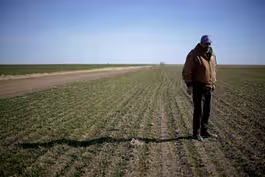
What Spain’s election means for far-right politics in Europe
Clip: 7/23/2023 | 5m 55sVideo has Closed Captions
What Spain’s election means for the far-right’s foothold in Europe
Polls in Spain are closed and votes are being counted in a general snap election that could see the far-right return to power for the first time in nearly 50 years. Socialist Prime Minister Pedro Sánchez called the early election after suffering big losses in local and regional elections in May. Bonnie Field, a political science professor at Bentley University, joins John Yang to discuss.
Problems playing video? | Closed Captioning Feedback
Problems playing video? | Closed Captioning Feedback
Major corporate funding for the PBS News Hour is provided by BDO, BNSF, Consumer Cellular, American Cruise Lines, and Raymond James. Funding for the PBS NewsHour Weekend is provided by...

What Spain’s election means for far-right politics in Europe
Clip: 7/23/2023 | 5m 55sVideo has Closed Captions
Polls in Spain are closed and votes are being counted in a general snap election that could see the far-right return to power for the first time in nearly 50 years. Socialist Prime Minister Pedro Sánchez called the early election after suffering big losses in local and regional elections in May. Bonnie Field, a political science professor at Bentley University, joins John Yang to discuss.
Problems playing video? | Closed Captioning Feedback
How to Watch PBS News Hour
PBS News Hour is available to stream on pbs.org and the free PBS App, available on iPhone, Apple TV, Android TV, Android smartphones, Amazon Fire TV, Amazon Fire Tablet, Roku, Samsung Smart TV, and Vizio.
Providing Support for PBS.org
Learn Moreabout PBS online sponsorshipJOHN YANG: Polls in Spain are closed and the vote count is underway in an election that could see the far right return to the government for the first time in nearly a half century.
Socialist Prime Minister Pedro Sanchez called the early election after suffering big losses in local and regional elections in May.
Pre-election polls showed the conservative Popular Party with a big lead, but short of an outright majority, that could open the door for the ultra-conservative Populist Vox Party to play a key role in forming a governing coalition.
Bonnie Field is a professor of political science at Bentley University.
At this hour, the Associated Press is reporting that with more than half the vote counted, the Socialist Party and the center right Popular Party are neck and neck.
Now, this is different from what the pre-election polls showed.
What do you make of that?
BONNIE FIELD, Bentley University: Yes, the election is turning out to be quite close, close in terms of both the percentage of the vote that the two lead parties are earning and then also very uncertain what the final distribution of the seats will be and therefore who will be able to form a government.
Right now it appears to be up for grabs.
Of course it is still early and so we need to wait final results.
JOHN YANG: As the voters went to the polls, what was on their minds, what was the driving factors and issues in this campaign?
BONNIE FIELD: I think the driving factors and issues have to do with the economy, of course, also how well Spain is doing with controlling inflation.
There are also issues, social issues on the agenda that some voters have in mind, for example, gender equality policy and LGBTQ rights and then also things like climate change.
So both I think economic issues but also social issues.
JOHN YANG: And of course this election is being watched very closely because of the right word drift in so many European countries.
What were the factors that drove that driving that in Spain?
BONNIE FIELD: Yeah, that's a very interesting question.
I would like to add that the far right in Spain is not on the rise compared to the last general parliamentary elections.
It is either stagnant or maybe depending on what the results show at the end of this evening, it could be on the decline.
Vox more than anything is a Spanish nationalist party and it really was opposed to the Catalan push for independence and advocated taking a very strong line against independence leaders, and that's really where it made its electoral breakthrough.
The push for independence in Catalonia really peaked in 2017.
And then Vox had its electoral breakthrough in 2018 in the region of Andalusia, and then became the third largest party in Spain in the second parliamentary elections of 2019.
JOHN YANG: As you say, the Vox Party really is sort of in decline right now.
But ironically, the Popular Party may have to turn to Vox in order to build a coalition.
What does that say about the fact that they are in decline, but they're going to have this outsized influence in the government?
JOHN YANG: Correct.
And we'll have to wait to see if they're on decline or if they're sort of just maintaining their position.
But it is true, though, Vox is not surging electorally.
It is gaining a stronger foothold, sorry, in the institutions.
So it is now governing in more regions of Spain after the May regional and local elections.
It's also governing more municipal governments and depending on the results tonight could end up governing at the level of Spain.
And that has a lot to do with what you just mentioned, which is that the Popular Party has really recovered electoral support after another center right political party called Citizens or Theodallanos has really disappeared from the Spanish political system.
And the Popular Party has been able to concentrate that vote in their hands and therefore increase its own share, which has had an effect on potential parliamentary arithmetic that it could be able to govern either with Vox or with Vox's support.
JOHN YANG: And Vox will have a lot of leverage.
They could have a lot of leverage in forming a government.
What do you think they're going to demand or what would they want to get out of a coalition government?
BONNIE FIELD: Vox is sort of a Spanish nationalist party.
It's very anti-feminist.
It has ultra-conservative social values, so it will look to attain some policy concessions and control potentially over policy areas relating, I think, to cultural and social policies, also potentially a change of policy about immigration.
The parties have a lot in common when it has to do with economic policy, so it wouldn't necessarily be Vox's influence there.
But if there is a right wing government, we are likely to see economic policy changes in a more kind of pro market neoliberal direction from the current sort of social democratic leaning government right now, particularly reducing taxes and things like that.
JOHN YANG: Bonnie Field of Bentley University.
Thank you very much.
BONNIE FIELD: Thank you.
Extreme heat sends thousands to ERs across the country
Video has Closed Captions
Clip: 7/23/2023 | 7m 26s | Extreme heat sends thousands to ERs across the country. Here’s how to stay safe (7m 26s)
‘Gaining Ground’ highlights effort to reclaim Black farmland
Video has Closed Captions
Clip: 7/23/2023 | 6m 32s | ‘Gaining Ground’ highlights efforts to reclaim land taken from Black farmers (6m 32s)
Providing Support for PBS.org
Learn Moreabout PBS online sponsorship
- News and Public Affairs

FRONTLINE is investigative journalism that questions, explains and changes our world.

- News and Public Affairs

Amanpour and Company features conversations with leaders and decision makers.












Support for PBS provided by:
Major corporate funding for the PBS News Hour is provided by BDO, BNSF, Consumer Cellular, American Cruise Lines, and Raymond James. Funding for the PBS NewsHour Weekend is provided by...

